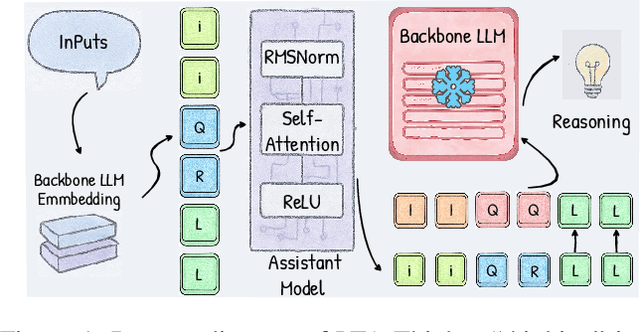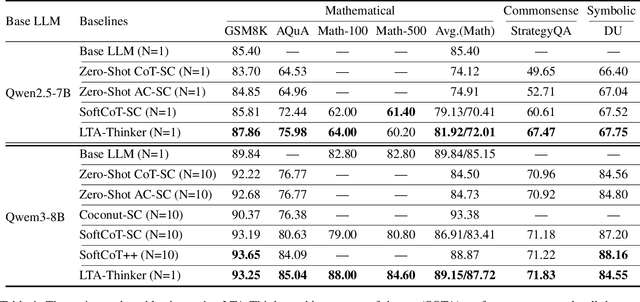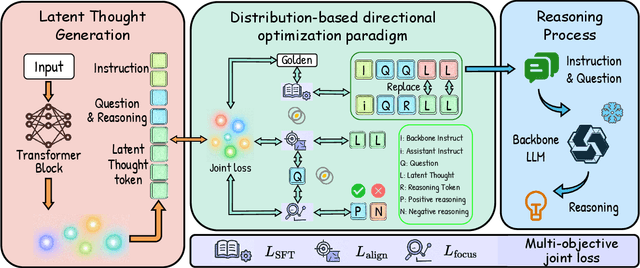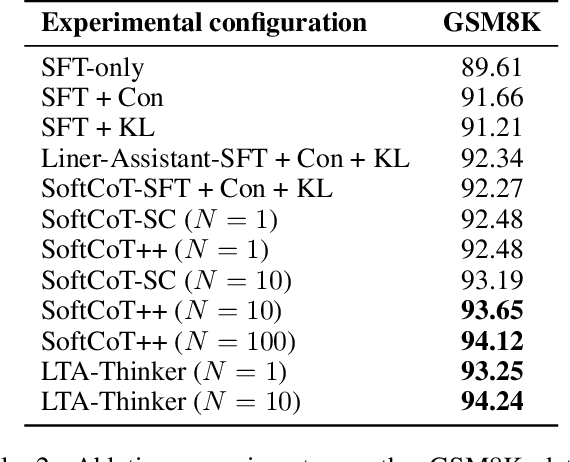Yiyang Qi
LTA-thinker: Latent Thought-Augmented Training Framework for Large Language Models on Complex Reasoning
Sep 16, 2025



Abstract:Complex Reasoning in Large Language Models can be dynamically optimized using Test-Time Scaling (TTS) to mitigate Overthinking. Methods such as Coconut, SoftCoT and its variant are effective in continuous latent space inference, the core bottleneck still lies in the efficient generation and utilization of high-quality Latent Thought. Drawing from the theory of SoftCoT++ that a larger variance in the generated Latent Thought distribution more closely approximates the golden truth distribution, we propose a Latent Thought-Augmented Training Framework--LTA-Thinker, which improves distributional variance and enhances reasoning performance from two perspectives. First, LTA-Thinker constructs a Latent Thought generation architecture based on a learnable prior. This architecture aims to increase the variance distribution of generated Latent Thought Vectors in order to simplify the overall structure and raise the performance ceiling. Second, LTA-Thinker introduces a distribution-based directional optimization paradigm that jointly constrains both distribution locality and distribution scale. This mechanism improves information efficiency and computational cost through a multi-objective co-training strategy, which combines standard Supervised Fine-Tuning (SFT) loss with two novel losses: Semantic Alignment Loss, which utilizes KL divergence to ensure that the Latent Thought is highly relevant to the semantics of the question; Reasoning Focus Loss, which utilizes a contrastive learning mechanism to guide the model to focus on the most critical reasoning steps. Experiments show that LTA-thinker achieves state-of-the-art (SOTA) performance among various baselines and demonstrates a higher performance ceiling and better scaling effects.
ConvergeWriter: Data-Driven Bottom-Up Article Construction
Sep 16, 2025Abstract:Large Language Models (LLMs) have shown remarkable prowess in text generation, yet producing long-form, factual documents grounded in extensive external knowledge bases remains a significant challenge. Existing "top-down" methods, which first generate a hypothesis or outline and then retrieve evidence, often suffer from a disconnect between the model's plan and the available knowledge, leading to content fragmentation and factual inaccuracies. To address these limitations, we propose a novel "bottom-up," data-driven framework that inverts the conventional generation pipeline. Our approach is predicated on a "Retrieval-First for Knowledge, Clustering for Structure" strategy, which first establishes the "knowledge boundaries" of the source corpus before any generative planning occurs. Specifically, we perform exhaustive iterative retrieval from the knowledge base and then employ an unsupervised clustering algorithm to organize the retrieved documents into distinct "knowledge clusters." These clusters form an objective, data-driven foundation that directly guides the subsequent generation of a hierarchical outline and the final document content. This bottom-up process ensures that the generated text is strictly constrained by and fully traceable to the source material, proactively adapting to the finite scope of the knowledge base and fundamentally mitigating the risk of hallucination. Experimental results on both 14B and 32B parameter models demonstrate that our method achieves performance comparable to or exceeding state-of-the-art baselines, and is expected to demonstrate unique advantages in knowledge-constrained scenarios that demand high fidelity and structural coherence. Our work presents an effective paradigm for generating reliable, structured, long-form documents, paving the way for more robust LLM applications in high-stakes, knowledge-intensive domains.
Ocean Data Quality Assessment through Outlier Detection-enhanced Active Learning
Dec 17, 2023Abstract:Ocean and climate research benefits from global ocean observation initiatives such as Argo, GLOSS, and EMSO. The Argo network, dedicated to ocean profiling, generates a vast volume of observatory data. However, data quality issues from sensor malfunctions and transmission errors necessitate stringent quality assessment. Existing methods, including machine learning, fall short due to limited labeled data and imbalanced datasets. To address these challenges, we propose an ODEAL framework for ocean data quality assessment, employing AL to reduce human experts' workload in the quality assessment workflow and leveraging outlier detection algorithms for effective model initialization. We also conduct extensive experiments on five large-scale realistic Argo datasets to gain insights into our proposed method, including the effectiveness of AL query strategies and the initial set construction approach. The results suggest that our framework enhances quality assessment efficiency by up to 465.5% with the uncertainty-based query strategy compared to random sampling and minimizes overall annotation costs by up to 76.9% using the initial set built with outlier detectors.
 Add to Chrome
Add to Chrome Add to Firefox
Add to Firefox Add to Edge
Add to Edge